

Ten New Studies of the “Local Economic Premium” Civic Economics analyzed public reports from Darden, McDonald’s, and PF Chang’s to project local procurement percentages for chain restaurants.
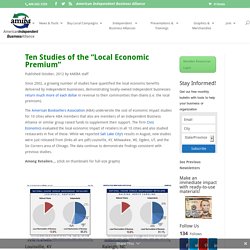
These eateries were estimated to recirculate an average of 30.4% of revenue within the local market. The multiplier is higher with restaurants than retailers largely because local labor costs comprise a higher portion of overall operating expenses. Also, local restaurateurs often can source significant portions of their fare locally — something not possible for many retailers. Framing the findings. Reporting such data to your audience in an accurate and memorable way can be tricky (learning the issue thoroughy can help), but here’s one idea: “More than one dozen studies over the past decade show locally-owned independent restaurants re-spend twice as much per dollar of revenue in our local economy than chain restaurants. Read more on the Multiplier Effect. The Multiplier Effect of Local Independent Businesses.
This resource also is offered in Spanish.
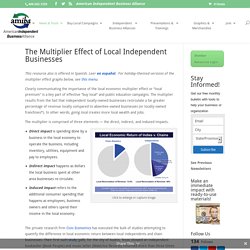
Leer en español. For holiday-themed versions of the multiplier effect graphs below, see this menu. Clearly communicating the importance of the local economic multiplier effect or “local premium” is a key part of effective “buy local” and public education campaigns. Institute for Local Self-Reliance. Last update: Jan. 8, 2016 In recent decades, policy across the country has privileged the biggest corporations.
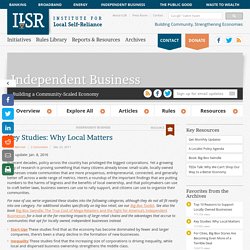
Yet a growing body of research is proving something that many citizens already know: small-scale, locally owned businesses create communities that are more prosperous, entrepreneurial, connected, and generally better off across a wide range of metrics. Institute for Local Self-Reliance. Le revenu universel, généalogie d’une utopie. LE MONDE IDEES | • Mis à jour le | Par Antoine Reverchon Si, le 5 juin, les Suisses votent « oui » à la proposition de création d’un « revenu de base universel et inconditionnel », la Confédération helvétique vivra une petite révolution : chaque citoyen suisse, actif ou inactif, SDF ou banquier, jeune ou âgé, recevra un revenu versé par l’Etat.
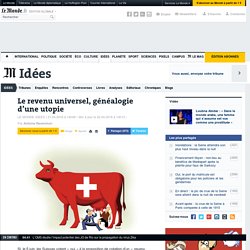
En Finlande et au Québec, les gouvernements ont engagé une consultation pour étudier la faisabilité d’une telle mesure. En Italie, elle est défendue par le mouvement 5 Stelle (« cinq étoiles »). You’re witnessing the death of neoliberalism – from within. What does it look like when an ideology dies?

As with most things, fiction can be the best guide. In Red Plenty, his magnificent novel-cum-history of the Soviet Union, Francis Spufford charts how the communist dream of building a better, fairer society fell apart. Even while they censored their citizens’ very thoughts, the communists dreamed big. Spufford’s hero is Leonid Kantorovich, the only Soviet ever to win a Nobel prize for economics. Rattling along on the Moscow metro, he fantasises about what plenty will bring to his impoverished fellow commuters: “The women’s clothes all turning to quilted silk, the military uniforms melting into tailored grey and silver: and faces, faces the length of the car, relaxing, losing the worry lines and the hungry looks and all the assorted toothmarks of necessity.”
But reality makes swift work of such sandcastles. Rémunérations: les actionnaires enragent, les patrons anglo-saxons engrangent. La rébellion vient parfois des endroits les plus inattendus : en l’occurrence, du monde feutré des assemblées générales (AG).
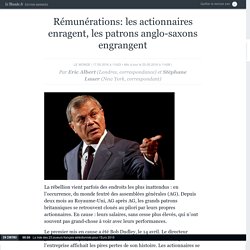
Depuis deux mois au Royaume-Uni, AG après AG, les grands patrons britanniques se retrouvent cloués au pilori par leurs propres actionnaires. Explicit cookie consent. Yanis Varoufakis. Click here for the examiner.com site Yanis Varoufakis produced half-hour video presentation and question-and-answer session.
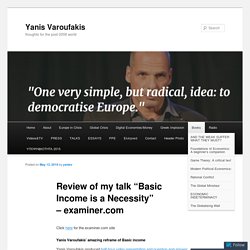
It was an address for the Future of Work Conference, in Zurich, Switzerland, 5th May 2016, at the Gottlieb Duttweiler Institute. In this presentation Yanis Varoufakis, totally reframes the concept of how wealth is created in nations and the societies they structure. He argues for a new view of minimum basic income, not as a safety net to save people who may fall, but a foundation on which people can stand to rise up as productive citizens. His presentation includes the new technological context that for the first time in history, smart machines will eliminate far more jobs than they create. What is really significant about this presentation is the creation of an alternative view of wealth creation which he brings about through reframing the concept of how most people think about wealth.
A good example of this is the Human Genome Project. Will the Universal Basic Income make us lonely? The Universal Basic Income (UBI) is the Big Progressive Idea on the tip of lots of people’s tongues at the moment.

It’s hardly a new concept. There are fragmentary references to basic incomes from the sixteenth century (in the work of Thomas More), and probably earlier. The New Digital Economy: Shared, Collaborative and On Demand. The sharing economy and on-demand services are weaving their way into the lives of (some) Americans, raising difficult issues around jobs, regulation and the potential emergence of a new digital divide A number of new commercial online services have emerged in recent years, each promising to reshape some aspect of the way Americans go about their lives.
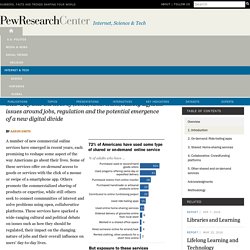
Some of these services offer on-demand access to goods or services with the click of a mouse or swipe of a smartphone app. Others promote the commercialized sharing of products or expertise, while still others seek to connect communities of interest and solve problems using open, collaborative platforms. These services have sparked a wide-ranging cultural and political debate on issues such as how they should be regulated, their impact on the changing nature of jobs and their overall influence on users’ day-to-day lives. Each of these individual platforms has its own unique user base. L’économie collaborative : un truc pour les jeunes riches ? Le très sérieux Pew Research Center a réalisé selon ses dires la première étude significative sur les usagers de l’économie dite « collaborative », ceux des plateformes telles que Uber, Airbnb ou de financement participatif.
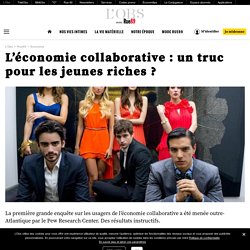
Il s’agissait non seulement de comprendre qui utilise vraiment ces plateformes, mais aussi quel regard ces usagers ont sur les questions sociales et politiques qu’elles posaient (nature du travail, statut des travailleurs, responsabilité etc.). Cette enquête ne porte que sur les Etats-Unis, mais elle permet néanmoins de tirer quelques enseignements pas inintéressants. Il y a des gens qui ne connaissent pas. Rue89.nouvelobs. Les héritiers. Je suis prof. Mes deux parents sont enseignants. Les deux parents de mon père étaient enseignants. Mon arrière grand-mère paternelle était institutrice, et son père était lui aussi instituteur. Pendant longtemps, cela m'a semblé une simple coïncidence amusante. Yanis Varoufakis: The Future of Capitalism. Yanis Varoufakis Basic Income is a Necessity. Le revenu de base, faux-ami du progrès social – Le Comptoir. Le revenu de base est souvent présenté en miroir du salaire à vie et assimilé à tort avec lui.
Leur opposition anime régulièrement les débats des milieux alternatifs, et a même été mise en scène sur le service public télévisuel. Pourtant, si les partisans du salaire à vie ont contre eux de devoir expliquer un système singulier face aux logiques économiques qui nous paraissent naturelles, ceux du revenu de base ont pour eux l’extraordinaire simplicité de leur idée : un revenu pour tous, sans condition (donc non soumis à l’impératif de travailler), pour toute la vie. L’idée est énoncée en peu de mots, immédiatement compréhensible, et animée des meilleurs sentiments de lutte contre l’exclusion : rien d’étonnant à ce qu’elle ait fait son chemin au point de donner naissance à une galaxie d’associations et collectifs, garnis de nombreux militants et sympathisants.
La galaxie des revenus de base Soyons dépendants La pyramide de Maslow. Christian Arnsperger. Un article de Wikipédia, l'encyclopédie libre. Les thèses qu'il développe dans certains de ses livres sont également inspirées par les outils théoriques de Ken Wilber. Christian arnsperger. Revenu inconditionnel ou salaire à vie ? Réseau Salariat vise l’institution d’un statut politique du producteur, donnant droit à un salaire à vie attaché à la qualification personnelle. Or cette proposition fait souvent l’objet de comparaison avec celle du revenu de base. Parmi les différentes versions existantes, nous choisissons de nous intéresser ici au revenu inconditionnel (RI) tel qu’il est promu ces dernières années dans plusieurs livres et articles par Baptiste Mylondo.
La proximité, en première approche, des objectifs de sa proposition avec ceux du salaire à vie nous semble propice à mettre en relief ce qui fonde finalement leur opposition. Le Salaire à Vie (Bernard Friot) Exploring the Next-Step Economy (Christian Arnsperger's blog): What transition? Part 4: Renewing the framework (Installment #4: Introducing an Economic Transition Income) This post is based in large part on joint work I did with Warren A.
Johnson at the end of 2010. Warren is an eminent geographer, now professor emeritus from San Diego State University, who has worked for four decades on natural resources and on pathways out of the current economic and social model. We wrote a paper together that was inspired by his two main books: on the one hand, his classic Muddling Toward Frugality, initially published to public acclaim in 1978 (going on to reach sales figures of about 50,000 copies) and re-issued in 2010 by Easton Studio Press; on the other hand, his recent manuscript provisionally entitled The Gift of Peaceful Genes and the Sustainable Revolution (forthcoming at Easton Studio Pres under a different title). 4.
Développons ensemble La Boutique sans argent ! La Boutique sans argent, c'est quoi ? Michel Bauwens : Blockchain, un rêve technocratique totalitaire. A Universal Basic Income Is the Utopia We Deserve.